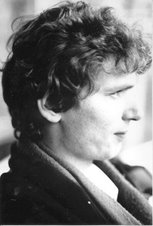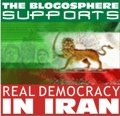I met a lot of people of Iran in the Netherlands, and one my best friends is from Iran actually. But I don't get it that Turkey created 'warm relations' with this regime which is, more or less, the same as the Nazi regime of Germany between 1933-1945.
But we, the world, are more civilized these days, or not? For sure Iran is not.
Below you will find a link on how in Iran they are 'hanging' their own people. Often without a decent trial.
It's a shocking clip, be aware!!
But Turkey is maybe the only country which can have influence on this 'Mullah' regime.
And are we calling the last 28 years of the Iranian 'top down' revolution genocide? Yes.
I watched this clip with tears in my eyes. But the crowd had fun, as you can hear. And it reminds me of the cheers when Devlet Bahçeli threw a rope during an election rally in the crowd, to hang the PKK leader Ocalan. So here we go:
Here...but be aware, it's shocking.
Sunday, July 29, 2007
Among the believers, an Islamic journey


During the Cold war which ended de facto in 1985, everybody was focused on the clash between American capitalism and Russian communism. But in 1981, V.S. Naipaul (Sir Vidiadhar Surajprasad Naipaul) published his book 'Among the Believers, an Islamic Journey'.
I was quite surprised reading his book and since then I am convinced that fundamentalist Islam is the real threat to world peace, as we can see today. Naipaul's writings deal with the cultural confusion of the Third World and the problem of an outsider, a feature of his own experience as an Indian in the West Indies, a West Indian in England, and a nomadic intellectual in a post colonial world.
"Islam sanctified rage - rage about the faith, political rage: one could be like the other. And more than once on this journey I had met sensitive men who were ready to contemplate great convulsions", is a quote from his book.
In 1998 he published Beyond Belief: Islamic Excursions among the Converted peoples (the link is a must-read for CHP and AKP fans))
This second travel book brought him (like in Among the Believers) to the non-Arab Islamic countries of Indonesia, Iran, Pakistan, and Malaysia.
"There probably has been no imperialism like that of Islam and the Arabs," he writes. In Iran he meets war veterans, who express their disillusionment and their sense of being manipulated by the mullahs, and in Indonesia he meets his former friend, who opposed the Suharto regime, and later became an establishment figure, an advocate of an Islamistic future.

In 2001, he was awarded the Nobel Price for Literature. To everybody interested in Turkey and Islam, I would recommend these books.
Subscribe to:
Comments (Atom)



